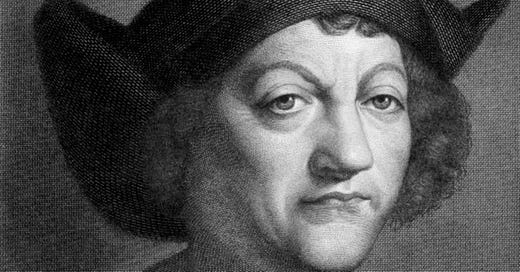"They should be good servants and intelligent": What Columbus Thought of Indigenous People
Read excerpts of Columbus' journal from when he first encountered indigenous people
Readers like you make this newsletter possible. If you appreciate learning more context about our nation’s history and how it relates to race and justice, would you consider becoming a paid subscriber today?
After about two months of sailing, Christopher Columbus and his bedraggled crew stumbled onto the shores of the Americas in 1492.
Of course, Columbus and his men did not walk onto uninhabited land. When they arrived, they found a place vibrant with flora and fauna as well as sophisticated communities of indigenous people who had dwelled there since before written memory.
Columbus’s band was not even among the first Europeans in North America. Centuries earlier the Scandinavians made landfall on the northern Atlantic coast in a failed colonization project.
Instead, Columbus’s arrival represented the beginning of an era of European colonization, motivated by profit and predicated on unpaid labor.
European contact with the indigenous peoples of North America presented questions about how to organize society, and no one had pre-established answers. Yet while the contours of American society after European contact had not yet been decided, the explorers still arrived with preformed ideas about the inherent superiority of lighter-skinned (that is, more European-looking) people.
One of Columbus’s early letters back to Spain compared indigenous and European physical features.
“As regards beauty, the Christians [Europeans] said there was no comparison, both men and women, and that their skins are whiter than the other [indigenous people]. They saw two girls whose skins were as white as any that could be seen in Spain.”
Europeans evaluated the people they encountered in North America based on how similar they were to themselves. This is a common human response when interacting with other groups, but the description in Columbus’s letter reveals that colonists equated lighter skin with beauty and desirability long before race-based chattel slavery became an institution.
Early reports of European contact with indigenous people demonstrate that the Europeans sometimes had missionary ends in mind, but their means and motivations were questionable. During his first voyage Columbus wrote,
“[The indigenous inhabitants] should be good servants and intelligent, for I observed that they quickly took in what was said to them, and I believe that they would easily be made Christians, as it appeared to me that they had no religion.”
To Columbus and his followers, the people they encountered would make “good servants.” Indigenous people were not considered intellectual or social equals but were valued based on their ability to do the will of Europeans.
Further, in the mind of Columbus and others, indigenous people did not have the sophistication to develop their own religious beliefs. Europeans failed to acknowledge the longstanding, well-developed religious beliefs and practices of the people they met.
Instead, they viewed indigenous men and women as blank slates on which Christian missionaries could write the gospel. This paternalistic view of evangelism permeates American church history.
For the next century and a half, European colonists struggled to establish settlements in North America. They faced new climates, diseases, starvation, and a short supply of people.
For a while, European hegemony over the land’s original inhabitants was far from a foregone conclusion. For instance, historian Richard White refers to the “middle ground” between cultures when “whites could neither dictate to Indians nor ignore them.”
Native Americans often resisted encroachment upon their lands through diplomacy and warfare. But vulnerability to European pathogens, frequent betrayals, and constant warfare decimated the indigenous American population.
On the day designated as “Columbus Day” we should remember the people who inhabited these lands long before Europeans and question why we honor a European instead of the indigenous inhabitants of North America.





By telling everone bragging Columbus about the horrific papal bulls leading to the Doctrine of Discovery. These documents set the stage for the colonialism, racism, slavery, and other horrific abuses inflicted on anyone not a white, Catholic, European man of Portuguese or Spanish decent. I also spend alot of time reading the work of Native Americans and Black authors.
AMEN!!! And, blessings in your new teaching appointment.